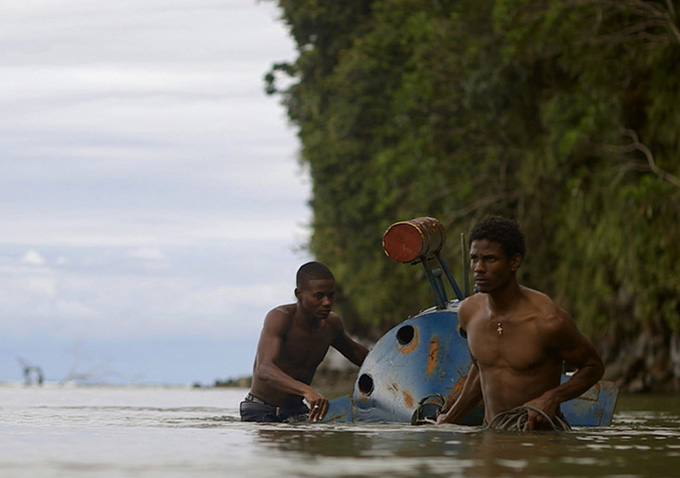
Joseph Wladyka‘s “Manos Sucias” is one out of a dozen feature winners from this year’s Tribeca Film Festival. It’s a startling and authentic slice of harsh life of a forgotten corner of the world, and the jury’s reasons for awarding it mention Wladyka’s involvement in the community and the months of research he spent getting immersed in the environment in order to shine the most truthful light possible on it. But, even without that knowledge, experiencing “Manos Sucias” in its brief 80 minute running time is all the indication you’ll need to know that the award for Best New Narrative Director was deserved. First features are rarely spotless, and Wladyka’s is no exception, but with the help of two fierce performances and a savvy cinematographer, this feature will fool you into believing that you’re watching a cleverly disguised documentary, and stir up the proper emotions.

Delio (Christian James Abvincula) and Jacobo (Jarlin Javier Martinez) are two estranged brothers living in Buenaventura, the impoverished port city by the Colombian coastline. Delio is a 19 year old aspiring rapper, with a girlfriend and a six month old son. He’s full of the kind of confidence typical of teenagers on the verge of adulthood, still young enough to be enchanted by the future. On the contrary, the older, quieter, and more methodical Jacobo has disenchantment written all over his contemplative expressions and stoical gestures. He is all alone, with his own haunting past, and just needs one big job before moving to Bogota. Both brothers live in the same slum neighbourhood nicknamed “The Invasion” yet through coincidence or fate they haven’t seen each other in years. When a job opportunity opens up, both of them jump at the chance to work and make some money, their defaced surroundings a constant reminder that the poverty line is above them, not below. Fishing hasn’t been doing so well, but the drug business is always booming and their job would be to transfer a rusty torpedo filled with cocaine to specific co-ordinates before it continues to Panama, evading the paramilitaries along the way. Supervised by one of the brigands, the job ends up being much trickier than expected.
There are instances in “Manos Sucias” (literally translated to “dirty hands” if your Spanish needs polishing) where storylines ruin a perfectly good scene. The exchange between the two brothers when we find out they’ve been living in the same neighbourhood without seeing each other is the kind of far-fetched contrivance that bursts the bubble to reveal a rust underneath a perfectly fine finish. A particular outburst from Jacobo, who has been the picture of thoughtfulness throughout, aimed at his younger brother is an extra layer that’s one size too big. Fortunately, these slip-ups are few and far between a picture brimming with powerful imagery and raw acting chops. Abvincula and Martinez continue to prove that there’s something exceptional when the right first-timers are found for a film. Think of Brandon Lopez in last year’s fantastic “La Jaula De Oro,” Catalina Sandino Moreno in 2004’s “Maria Full Of Grace” and the three main boys in 2002’s “City Of God.” It’s true that the latter trio had their first roles in a television episode, but that was directed by the same Fernando Merielles who ended up putting them on the big screen for the first time. The raw, unpolluted emotions that allow for natural instincts to completely govern a performance is something that’s only truly achieved by novices in front of the camera. Abvincula and Martinez have the kind of on-screen chemistry that makes you forget how fabricated their character’s circumstances appear to be at times.

Then there’s the cinematography by Alan Blanco, a man who like Wladyka has only worked on shorts before “Manos Sucias.” Most of the scenes occur in darkness or dusk, the neglectful sun rarely shining bright during the daytime, but it serves the mood all too well and gives a sense that Blanco and Wladyka have a firm grip over their story’s tone. One of the most fascinating facts behind the production is that Blanco is credited with co-writing the story with Wladyka. Having the cinematographer involved with both the look and the narrative is an eye-opening demonstration in filmmaking all by itself. More often than not, the wordless scenes that see the characters reacting to violence, observing their jungle-like surroundings once they’ve left Buenaventura or glaring at each other with condemnation, linger on and only get slightly disrupted by the rushed and inconsistent structure.
Overall, Wladyka has directed an assured piece of work in “Manos Sucias.” With the help of Spike Lee (who is one of the producers) and an encouraging award from Tribeca, it will be interesting to see what he does next. As long as he retains his knack for finding true talent in front of and behind the camera, there’s no reason to not feel excited for what the future has in store. Though “Manos Sucias,” like the compelling local songs used to supplement the melancholic mood, often feels like fragments of a picture glued together by a temporary adhesive, the experience will leave you believing that you’ve just witnessed something very real and, even with its all-too-short running time, still manages to pack quite a punch. [B]
Browse through all our coverage of the 2014 Tribeca Film Festival by clicking here.

